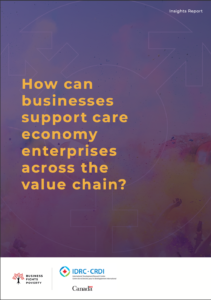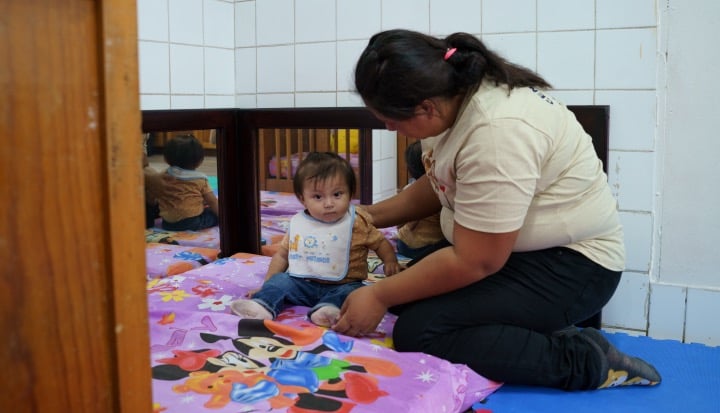
The interviews with five Business Fights Poverty Lead Partners, Primark, Unilever, Anglo American, Standard Chartered and Mastercard Center for Inclusive Growth, focussed on two areas. Firstly, how their companies are currently supporting social entrepreneurs and secondly if and how their companies are addressing the care economy through workplace policies.
These lines of questioning led to 4 overarching insights:
- Companies need to better understand how care impacts their business
- Workplace policies can offer a springboard to engage with care enterprises (e.g. responsible recruitment of domestic workers, responsible sourcing of cleaning services)
- Companies with extensive supply chains could help enterprises achieve scale (companies can be a bridge essentially linking their workers with social enterprises to help them access low cost, quality care services)
- Philanthropic entrepreneurship programmes could be more focussed on supporting care enterprises.

INTERVIEW WITH PAYAL DALAL, SENIOR VICE PRESIDENT, SOCIAL IMPACT, INTERNATIONAL MARKETS AT MASTERCARD CENTER FOR INCLUSIVE GROWTH
Why is social innovation important to your company and why did you develop an entrepreneurship programme?
Support for small businesses has been a long-standing focus for us as we see them as the engines of inclusive growth – responsible for at least 40% of GDP in emerging economies and 50% of employment worldwide.
Inclusive growth is our focus – ensuring everyone can benefit from the economy, everywhere. We have to recognise the economy is increasingly digital, and so our collective task is to ensure the digital economy is expanding inclusion rather than exacerbating inequalities. Our theory of change is very much centered on the fact that if we can help small businesses embrace and succeed in the digital economy, an inclusive digital economy is more likely. But it’s not digital adoption for the sake of being digital; it’s about helping small businesses use digital tools to save time and make more money. At the end of the day, it’s all about bolstering the resilience of small businesses. The pandemic and now cost of living crisis show that small business resilience is still an issue – an issue critical to sustainable inclusive growth.
How did/do you identify the sorts of entrepreneurs you want to support?
We have done a lot of work on segmentation over the years, and our programmatic data has helped us narrow into a segment we call Strivers – micro and small businesses who have a propensity to grow, have been in business for at least a year, have embarked on the digital journey and have between 2-10 employees. In our analysis, this segment has the highest return on investment (job creation, contribution to local GDP, etc) and is mostly likely to drive significant impact at community level. And of course, we also apply an inclusion lens to our Striver segmentation to ensure those that are systematically excluded, like women entrepreneurs, entrepreneurs of colour or migrant entrepreneurs, have additional, tailored support.
How does your company support entrepreneurs and does support differ depending on what stage of the journey the entrepreneurs are at?
Programs are of course context and needs dependent, but broadly speaking we try to do three things: help small businesses “get capital, go digital and grow their networks and know how.” When it comes to unlocking access to capital, especially for underserved entrepreneurs, we’ve worked at the financial service provider (FSP) level and provided technical assistance to FSPs to digitalize and/or apply a human centered design to financial products, in partnership with Accion and CARE. For example, with CARE we worked with banks in Pakistan to change collateral lending requirements for women entrepreneurs; because gold jewellery is so pervasive, we got the bank to agree to allow gold jewellery to be used as collateral. That enabled a lot more women to apply for business loans. In Vietnam, we supported gender sensitivity training to loan officers to ensure women weren’t turned away because of conscious/unconscious bias.
In terms of helping small businesses go digital, we’ve done a lot of work to understand where to engage small businesses on their digital journey. It’s important to go where the entrepreneurs already are, so we’ve focused on helping small businesses maximize social and e-commerce platforms and we’ve supported platforms, like MicroMentor, to connect small businesses to each other – as they are much more likely to trust another small business’ advice on digitalization. This goes to the power of networks.
Do your programs reflect the challenges entrepreneurs might face in balancing caring and work responsibilities?
This is something we are becoming more and more aware of. At the moment, we are experimenting with providing childcare services to displaced Ukrainian women entrepreneurs in Poland, as we recognized that child and eldercare was going to be a significant constraint to these entrepreneurs establishing economic livelihoods in a new country. Initial feedback has been overwhelmingly positive – the entrepreneurs are saying that without the childcare resource, they wouldn’t have been able to focus on starting/restating their businesses in Poland. We will be making another announcement about childcare support to entrepreneurs and the impact on entrepreneurial finance health in the coming months, so suffice to say, it’s a place of increasing interest for us.
We also know that time poverty is a real constraint for women entrepreneurs. As we’ve seen in our on-going partnership with Accion, which has reached millions of women entrepreneurs in eight emerging markets, digital tools provide small business owners with time-savings, enabling women to better balance the needs of their customers while managing their households and providing for their families.
How could you envisage the Center for Inclusive Growth supporting care economy entrepreneurs?
Depending on the data and impact from our pilots, it is possible that childcare could be an additional asset our programs offer to ensure small businesses to grow. We still have a lot to learn in this space and welcome the learnings and insights from others so we can continue to refine and improve our programs and support of small businesses everywhere.
Mastercard Strive – Launched in 2021 and supported by the Mastercard Center for Inclusive Growth, Strive is a portfolio of philanthropic programs aimed at helping small businesses around the world thrive in the digital economy. To learn more, visit https://www.strivecommunity.org/.
READ MORE INTERVIEWS FROM THIS SERIES:










